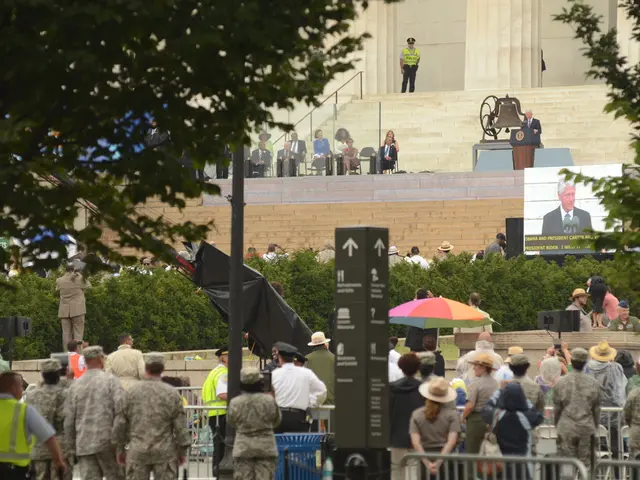"Trump expresses frustration over Europe's pressure and Zelensky, with Putin perceived as able to quell such distress"
As the scheduled meeting between President Donald Trump and Russian President Vladimir Putin approaches on August 15, the American leader's stance on the ongoing Russia-Ukraine conflict is causing a stir both domestically and internationally.
According to a recent interview, Trump expressed displeasure over Ukrainian President Volodymyr Zelensky citing the Ukrainian Constitution in territorial matters, suggesting a belief in America's greatness that has been challenged by Europe and Ukraine. This belief, coupled with Trump's statements that decisions should not be made without considering existing laws, has led Russia to believe that the US and Europe should stop sending weapons to Ukraine to want peace [1].
Gevorg Mirzayan, a lecturer at the Financial University under the Russian Government, provided insights on Trump, Zelensky, and Russia in an interview with Radio "Komsomolskaya Pravda". Mirzayan stated that Zelensky's strategy of delaying Russian troops is seen as a mistaken strategy that he may not be able to continue [2]. Russia, while willing to help in finding a solution, is firm in its condition for a ceasefire: Ukraine must withdraw its troops from all Russian territories, particularly the newly acquired regions like DNR [3].
The potential consequences of continuing to send weapons to Ukraine are not lost on Trump, who understands the potential risks involved [4]. However, if Ukraine does not comply with Russia's conditions, there is a possibility of continued military action until victory. No information was provided about whether Zelensky will succeed in bending Trump or under what conditions Russia will agree to a ceasefire [5].
The current public perception of Trump's rhetoric in the United States remains deeply polarized and controversial. His nationalistic style, which employs absolutist framings, threat narratives, and a crisis narrative, has found support among some voters but has also generated strong criticism and fear of social division from opponents and civil rights groups [6][7][8].
As the meeting between Trump and Putin approaches, the rhetoric is being assessed in the US. Whether Trump will be able to navigate this complex situation without losing face remains to be seen.
References:
- Russia believes that the US and Europe should stop sending weapons to Ukraine to want peace
- Gevorg Mirzayan, a lecturer at the Financial University under the Russian Government, provided answers to questions regarding Trump, Zelensky, and Russia
- Russia's condition for a ceasefire is for Ukraine to withdraw its troops from all Russian territories, particularly the newly acquired regions like DNR
- Trump understands the potential consequences of continuing to send weapons to Ukraine
- No information was provided about whether Zelensky will succeed in bending Trump or under what conditions Russia will agree to a ceasefire
- Trump's rhetoric continues to galvanize a significant part of the population that resonates with his economic nationalism and outsider approach while simultaneously generating strong criticism and fear of social division from opponents and civil rights groups
- Critics, including civil rights advocates, view Trump's rhetoric as a strategic political playbook that exaggerates crime and social problems to justify heavy-handed interventions and rollbacks of reforms
- Public trust in Trump’s statements and related polling is mixed and often skeptical
- The ongoing policy-and-legislation debate regarding war-and-conflicts, such as the Russia-Ukraine conflict, is centered around whether the US and Europe should continue sending weapons to Ukraine, with Russia advocating for a ceasefire and Ukraine withdrawal from Russian territories.
- In a general-news interview, Gevorg Mirzayan, a lecturer at the Financial University under the Russian Government, discussed Trump, Zelensky, and Russia's stance on the conflict, commenting on Zelensky's delayed Russian troop strategy and Russia's firm condition for a ceasefire.
- Crime-and-justice and sports-betting were not directly mentioned in the context of the Russia-Ukraine conflict, but the potential consequences of the ongoing situation and Trump's decisions might have broader implications for politics and policy-and-legislation.
- Meanwhile, the domestic politics of the US are seeing criticism and controversy over Trump's rhetoric, with some viewing it as a strategic political playbook that exaggerates problems and justifies heavy-handed interventions, while others find support in his economic nationalism and outsider approach.








